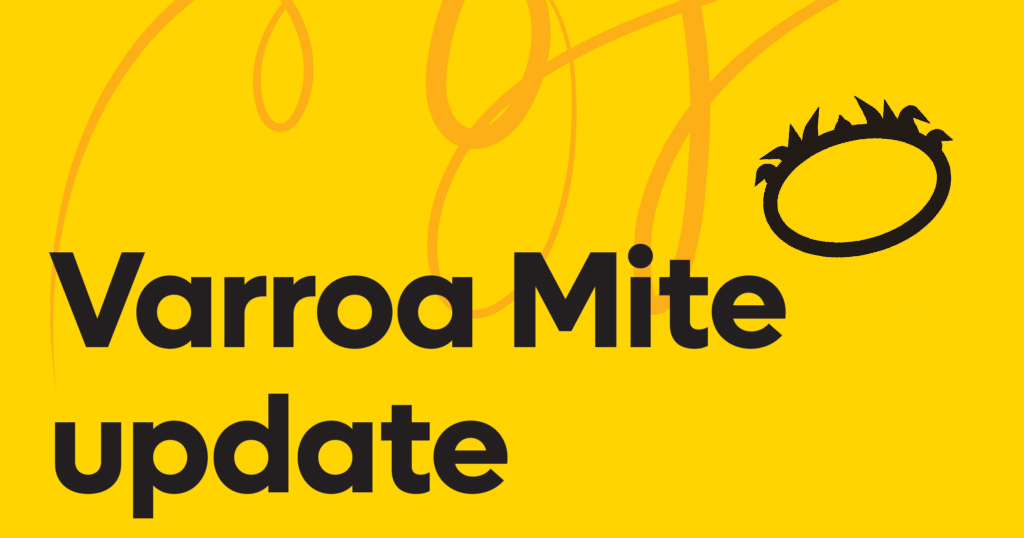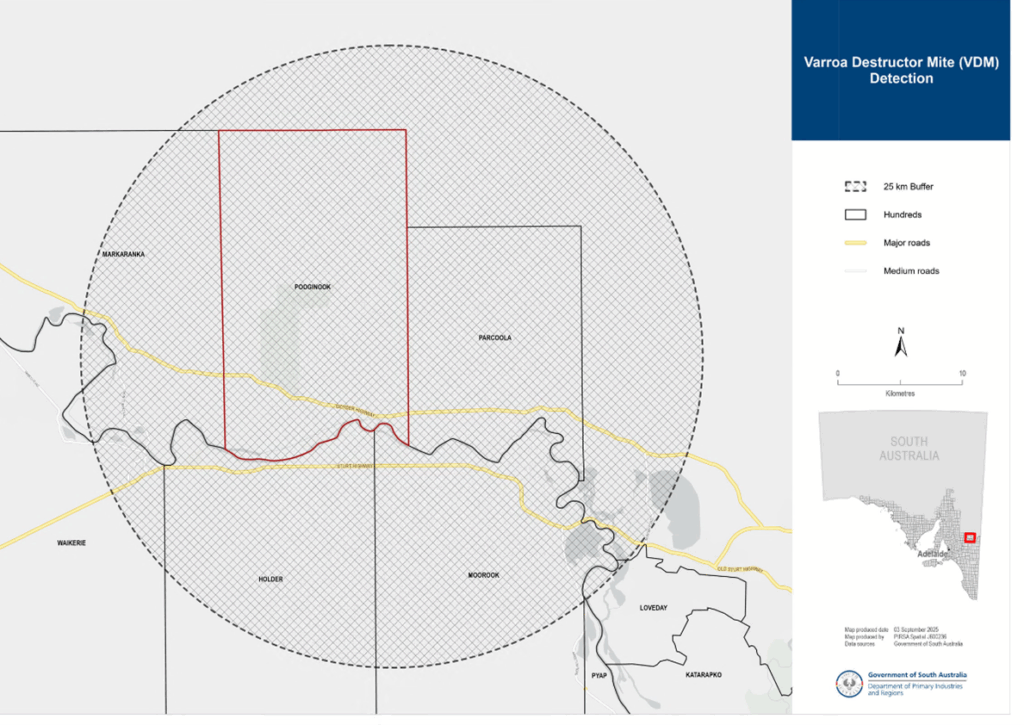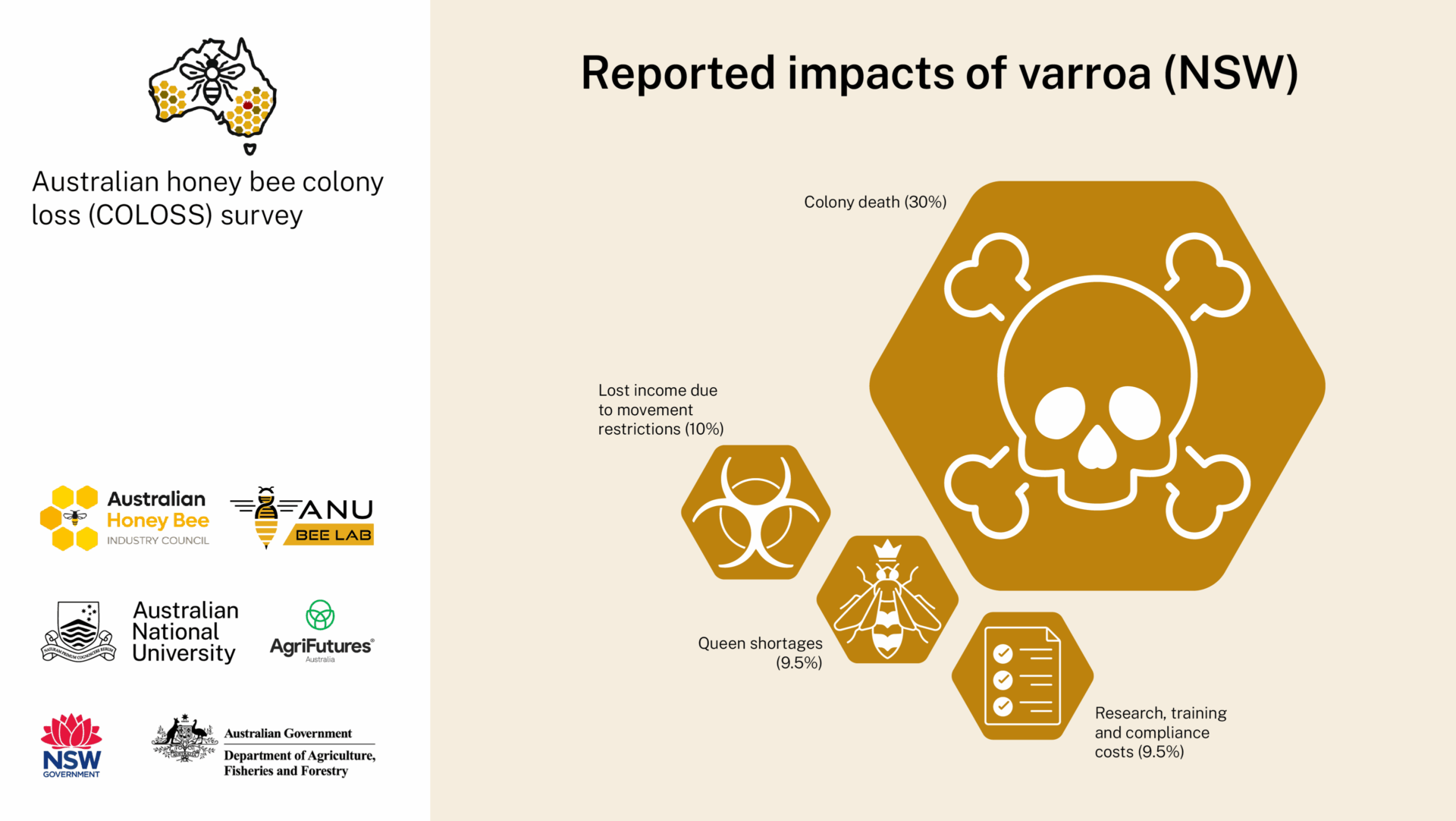AHBIC Industry Update 71 – T2M & SA Update
2 October 2025South Australia Varroa Update All of the hives from Queensland were subjected to surveillance, treated by PIRSA and have left the state as per their original permit requirements. WA hives […]

South Australia Varroa Update
All of the hives from Queensland were subjected to surveillance, treated by PIRSA and have left the state as per their original permit requirements. WA hives on the same orchard also underwent PIRSA surveillance, treatment and have since left SA on 12 September.
PIRSA have been in contact with 24 beekeepers whom have registered address’ within 25km radius of the initial detection. Following this contact, PIRSA have since conducted acaracide and sticky mat surveillance across 3 separate beekeeper apiaries, two which were within 10km of the original positive apiary. So far, in-field visual inspections of mats show no varroa, samples are still being processed through the SARDI laboratory. PIRSA has increased resourcing at SARDI to assist in a series of repeat routine surveillance activities for these SA colonies with 30, 60 and 90 day cycles planned over the coming months.
PIRSA staff also undertook localised visual surveillance of the positive area, determining several feral colonies, prompting swarm catch box deployment and a further 7 sites for managed surveillance colonies to be installed. These sentinels, through longer term surveillance, will provide an indication if varroa mite has become established among the feral or any poorly managed colonies in the area.
Beekeepers Check your Hives!!
AHBIC strongly recommends beekeepers across Australia, especially in South Australia, Western Australia, Northern Territory and Tasmania that it is more important than ever to conduct surveillance on colonies in your care. With spring conditions on the way, checking hives for presence of varroa using one of the preferred methods is essential. In those states free of varroa, if you suspect you have found mites then ring the Exotic Plant Pest Hotline 1800 084 881. This is a stressful time for beekeepers across the industry, and we remind beekeepers that there is support and help if you need it. In South Australia the following contacts for PIRSA and services are available to beekeepers.
PIRSA Apiary Unit:
- email: beebiosecurity@sa.gov.au
Exotic Pest Hotline:
(to notify detection / suspected
- Freecall 1800 084 881
South Australian VDO support:
Please direct enquires for VDO support to SA Extension and Engagement Coordinator:
- Rahul Shankar
0408 612 856
or pirsa.beebiosecurity@sa.gov.au

Other National contact for VDO support:
Mental health and financial support are available from:
- Beyond Blue, 1300 22 46 36
- Lifeline, 13 11 14
- Rural Aid (Mon to Fri 9am – 5pm), 1300 175 594
- Rural Financial Counselling Services
Cross Border Movements
Cross border movement regulations are beginning to relax as Victoria and Queensland confirm the continued inevitable spread of Varroa in their states. Beekeepers must ensure they meet required cross border documentation for each state, with different requirements for hives, queen bees and used equipment.
So far Victoria has removed their permit system, however a health certificate must be granted prior to movement of bees, bee products and used equipment. Details for Victoria can be found on the AgVic website. For movements into Queensland, hives must have below threshold mite levels, management records maintained for 24 months, for all movements into QLD from varroa positive states a permit for varroa mite carrier must be granted which can be found on the QLD DPI website. All other states, check the relevant state and territory websites or the AHBIC interstate hive movement guideline 2025.
Honeybee Virus Baseline Survey
The National Varroa Management Program has recently completed the National Bee Virus Baseline Project and participating beekeepers will receive contact from department staff to deliver individual results. The nation-wide honey bee virus survey has established a baseline for endemic bee viruses as well as a national knowledge base providing continued confidence that exotic viruses remain absent from our shores. Testing results have provided reassurance that Australia is currently Deform Wing Virus (DWV) free. The program is grateful to all participating beekeepers with over 5,500 samples voluntarily taken from around Australia. Further detailed report can be viewed on the website: National Baseline Project — National Varroa Mite Management Program.
Australian Colony Loss Survey (COLOSS)
The Australian Colony Loss Survey is open again for 2025, aiming to recruit up to 500 or more commercial beekeepers. All entries give Coloss Australia the chance to capture the wins, challenges and help shape programs, policies and resources, tailoring improved investment, support and opportunities to really make a difference to Australia’s beekeeping industry.
What will 2025 results tell us? Your input counts, so jump over to take the 10-15 minute survey before it closes 1 November: COLOSS Survey 2025

You can reach out to AHBIC via:
National Varroa Mite Coordinator
Bianca Giggins
0402 467 780
AHBIC, its employees, executive and consultants expressly disclaim all and any liability to any person in respect of anything, and the consequences of anything, done or omitted to be done in reliance, whether wholly, partly, upon the whole or any part of the contents of this industry update document.
